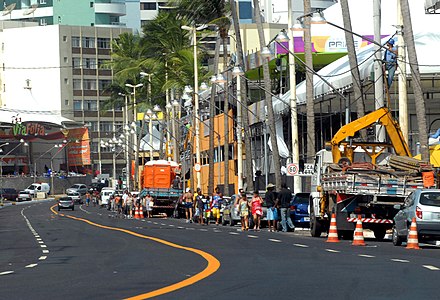
The Richmond District is a neighborhood in the northwest corner of San Francisco, California, developed initially in the late 19th century. It is sometimes confused with the city of Richmond, which is 20 miles (32 km) northeast of San Francisco.
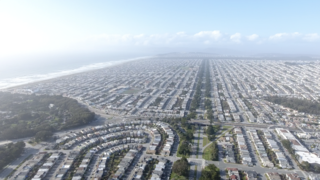
The Sunset District is a neighborhood located in the west-central area of San Francisco, California, United States. It is the largest neighborhood in the West Of Twin Peaks Neighborhoods in San Francisco.
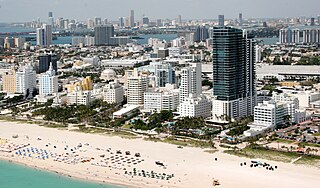
South Beach, also nicknamed SoBe, is a neighborhood in the city of Miami Beach, Florida, United States, located due east of Miami city proper between Biscayne Bay and the Atlantic Ocean. The area encompasses all of the barrier islands of Miami Beach south of Indian Creek.
Midland Beach is a Staten Island neighborhood. It lies along the east-central coast of the island, in the area known locally as the "Mid-Island, Staten Island" or the "East Shore".

Maceió is the capital and the largest city of the coastal state of Alagoas, Brazil. The name "Maceió" is an Indigenous term for a spring. Most maceiós flow to the sea, but some get trapped and form lakes.

Barra da Tijuca is a neighborhood or bairro in the West Zone of Rio de Janeiro, Brazil, located in the western portion of the city on the Atlantic Ocean. Barra is well known for its beaches, its many lakes and rivers, and its lifestyle. This neighbourhood represents 4.7% of the city population and 13% of the total area of Rio de Janeiro.

Balneário Camboriú is a major beach resort city in the Brazilian southern state of Santa Catarina. The city, with its steep hills dropping down to the sea, is popular amongst South Americans. The main ocean boulevard is called Avenida Atlântica. Balneário Camboriú is famous for the cable car which links the city's central beach and the beach of Laranjeiras. The city is located 10 km (6.2 mi) south of the city of Itajaí, 96 km (60 mi) south of the city of Joinville, and 80 km (50 mi) north of the state capital, Florianópolis. The city has a population of 124,557, which swells to over one million in the summer.

Beach 60th Street, signed as Beach 60th Street–Straiton Avenue, is a station on the IND Rockaway Line of the New York City Subway. Located in Queens on the Rockaway Freeway at Beach 60th Street, it is served by the A train at all times.

Jaboatão dos Guararapes is a city in the state of Pernambuco, Brazil. It is a part of the Recife metro area. The population was 687,688 according to the Brazilian Institute of Geography and Statistics (IBGE) in 2009, making it the second most-populous city in the state of Pernambuco and the 26th in Brazil, ahead of major Brazilian state capitals such as Cuiabá and Aracaju. The city is a very important industrial center, hosting companies like Unilever and Coca-Cola. It is bordered by Recife in the North, Cabo de Santo Agostinho on the south, and Mangue forests to the west in Moreno.

Bahian Carnival is the annual carnival festival celebrated in the Brazilian state of Bahia, mainly in its capital, Salvador. The event lasts officially for six full days: it starts on a Thursday, then follows the usual five days of carnival. The term may also be used to comprise related events that happen immediately before or after the carnival in Bahia. Therefore, extending the duration for up to twelve days.

Barra is a neighborhood located in the south zone of the city of Salvador, Bahia, Brazil. Barra is one of the most traditional neighborhoods of the city, and is also one of the most popular neighborhoods for tourists, with many attractions, like Farol da Barra Lighthouse, Morro do Cristo Hill, Farol da Barra Beach, and Porto da Barra Beach.
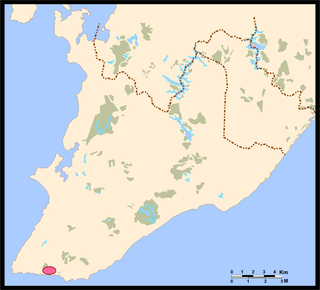
Ondina is a neighborhood located in the southern zone of Salvador, Bahia. Carnival ends here, several kilometers up from Barra. Ondina has a nice urban beach and some of the big, standard-style hotels.

September Seven Avenue colloquially known as Seven Avenue is an important road in the city of Salvador, Bahia, Brazil. It starts at the Farol da Barra, Barra (Neighborhood), and ends at Castro Alves Square, Historic Centre.
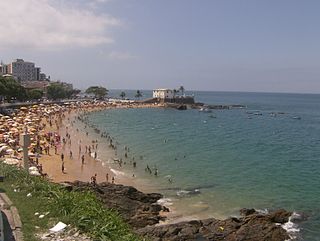
Porto da Barra Beach is located in Barra neighborhood in the city of Salvador, Brazil. It is located at the entrance of the Baía de Todos os Santos, with a small, white colonial fort at one end and a whitewashed church sitting up on a hill at the other.
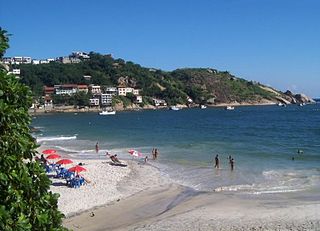
Barra de Guaratiba is a neighborhood in the Western Zone of Rio de Janeiro, Brazil.
